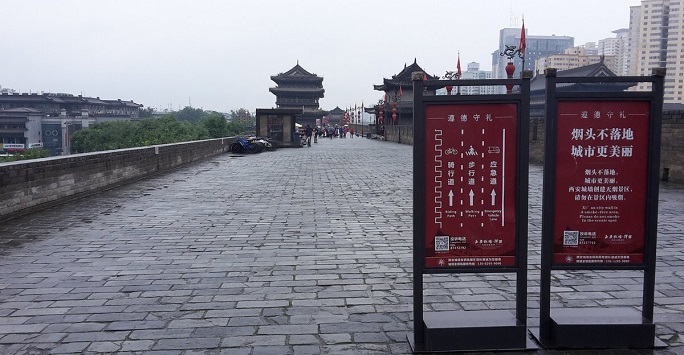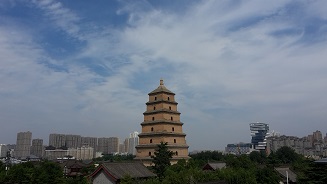Exploring heritage diplomacy in an uncertain world. As the UK contemplates its post Brexit future, can heritage be used to be build bridges to the world?
Posted on: 27 September 2019 by Andrew McClelland in Blog

Heseltine Institute Research Associate, Andrew McClelland, draws upon recent experiences at two international fora in the UK and China, which speak in different ways to the uses of heritage within contemporary diplomatic affairs in an era of shifting geopolitical power.
Heritage has long been mobilised by states to enhance their attractiveness and influence on the world stage. The UK’s cultural resources contribute significantly to its high ranking within prominent global indices of “soft power” (e.g. Portland & USC Center on Public Diplomacy, 2018). Against the backdrop of continued uncertainty over the country’s future relationships with the EU and others, many UK heritage organisations are more explicitly orientating their agendas towards the international domain. For instance, recent reports and strategic plans by the National Lottery Heritage Fund, Historic England and The Heritage Alliance, wholly or partially focus on international engagement. Heritage is also now embedded within the UK’s overseas development assistance programmes (e.g. Cultural Protection Fund). While the Government’s “Global Britain” agenda provides an immediate policy motivation, the burgeoning emphasis on heritage in and as diplomacy reflects a worldwide trend capturing the attention of heritage studies scholars (e.g. Winter, 2015; Clarke, 2018).

Here, I draw upon my recent experiences at two international fora in the UK and China, which speak in different ways to the uses of heritage within contemporary diplomatic affairs in an era of shifting geopolitical power. In revisiting both events, I touch upon challenges facing UK diplomats and policymakers as they confront a radically different future orientation for the country, concluding with reflections on research avenues pertinent to heritage diplomacy. First, in September 2019, I participated in the 2nd Heritage Roundtable of the University Alliance of the Silk Road (UASR), a higher education platform comprising over 150 universities from 38 countries predominantly located in the Eurasian region. Xi'an Jiaotong University welcomed several dozen academics and practitioners from UK, Italian, Australian, Japanese and Chinese institutions, with our discussions coalescing around the theme of “Multidisciplinary Approaches to Heritage Conservation”. The University of Liverpool, as a founding member of the UASR, hosted the 1st Heritage Roundtable in 2018.
People-to-people exchanges of this nature are a common practice of cultural diplomacy, of course, providing opportunities to share expertise, develop international networks, and foster mutual understanding. As the UK National Commission to UNESCO’s report, Cultural Heritage Innovation: opportunities for international development, emphasises, the diverse activities of UK universities and heritage institutions ensures they are well-placed to contribute to furthering sustainable development overseas and “UK government priorities” (UKNC, 2019). However, in light of substantial Chinese investment in its cultural heritage, as illustrated by the marked expansion in the number of inscribed UNESCO World Heritage Sites within the country (vying with Italy for top spot), the Roundtable was an ideal setting to examine first-hand the evolving nature of heritage diplomacy in the emerging “Asian century”. Indeed, Xi’an, as an ancient imperial capital of China for many centuries, is promoted as an eastern departure point of the modern-day Silk Roads network, a UNESCO inscribed 5,000 km route connecting China, Kazakhstan and Kyrgyzstan, encompassing 33 World Heritage sites (Silk Roads: the Routes Network of Chang'an-Tianshan Corridor – https://whc.unesco.org/en/list/1442/
While many of the Roundtable presentations covered scientific and technical aspects of conservation, others addressed the historical and contemporary significance of the Silk Roads. Particularly fascinating, from my perspective, was Tim Winter’s (Prof of Critical Heritage Studies at the University of Western Australia) take on the “geocultural power” of China as it purposively weaves civilizational discourses of heritage and culture into the unfolding “Belt and Road” initiative, symbolically underpinning infrastructural development and wider cross-border relations of trade, tourism and international cooperation. In essence, the Silk Roads network is argued to represent a “site of cultural production and cultural politics”, with China positioning itself via an interconnected series of ambitious initiatives as the centre of both “regional and East-West contact” (Winter, 2019). Critical perspectives from the humanities and social sciences are therefore essential to illuminate the deeper meanings of these unfolding shifts in global power beyond their geopolitical and economic dimensions.
Second, in October 2019, I took part in an informative session during World Heritage UK’s (WH:UK) Annual Conference, hosted at Llangollen Pavilion, Wales. Prof Ian Wray chaired the session on “Heritage, Soft Power and Diplomacy”, which elicited insights from the Chief Archaeologist of Ireland, Michael MacDonagh, and Giles Smith, Deputy Director for Heritage, Tourism and Cultural Diplomacy at the Department for Digital, Culture, Media and Sport (DCMS). The latter updated delegates on the proposed UK Government soft power strategy, the expected publication date of which remains uncertain given the present febrile nature of UK politics. However, as an advocacy organisation for the UK’s World Heritage Sites, the session provided a platform for WH:UK (2019) to reiterate the contribution that these globally-recognised heritage assets make to the UK’s “Soft Power, cultural strength, and… international standing”. Indeed, this message permeates their latest research report, UK World Heritage: Asset for the Future – A Review of the State of UK World Heritage Sites.
As the first speaker in the session, I sought to delineate critical challenges in respect of the mobilisation of heritage and the past in the UK's diplomatic futures: see my slides here – https://worldheritageuk.files.wordpress.com/2019/11/andrew-macclelland.pdf For instance, the British Council (2018) highlights various competitive pressures and short-long term threats to the UK’s soft power status, including the substantial investments being made by countries such as China and Russia in their cultural resources. Concerning the latter, an online tool usefully visualises the expanding global footprint of other states vis-à-vis their cultural relations institutions: follow this link – www.britishcouncil.org/sites/default/files/j029_british_council_cultural_relations_map.pdf Without bolstering the critical agencies of UK soft power, and sustaining a meaningful presence within the developed and developing world, the British Council argues that the UK Government’s vision of a global Britain will not be realised.
Other challenges are arguably more problematic. First, the current political landscape is not conducive to progressing a coherent narrative about the UK’s purpose and place in the world; identified as a strategic priority by the House of Lords Select Committee on Soft Power and the UK’s Influence (2014). Second, in renegotiating the UK’s relationships with the EU, Commonwealth, and growing powers, diplomats and policymakers confront multiple tensions partially rooted in divergent understandings of the past and their political use in the present. These include mediating the apparent resurgence in populist nationalism, and revalorisation by some of imperial heritages and colonial histories. Given that a key objective of heritage diplomacy is the co-construction of a “shared heritage” between states, this is clearly more difficult to achieve when interpretations of the past radically differ. Finally, delivering Brexit, while simultaneously respecting Devolution settlements, and managing the UK’s constitutional strains, further complicates an already complex and fraught process.
These “interesting times” are also characterised by innovation and new ways of working. For example, city-to-city networks are now to the fore in tackling challenges related to health, climate change and persistent socio-economic inequalities. With cities advocating for “a seat at the top table” within multilateral diplomatic relations (e.g. Acuto, 2016), and “city diplomacy” emerging as a subfield of scholarly interest, the prospective role of cities such as Liverpool merits greater attention. As an internationally-oriented port city, home to numerous diaspora communities, and with strong links to countries like China through twinning status with Shanghai, Liverpool appears well-placed to capitalise on its soft power strengths. The ongoing travails over Liverpool’s “in danger” World Heritage Site are a cause of considerable concern. However, as Zabeth Teelucksingh, Executive Director of the Global Philadelphia Association, talked about at the WH:UK conference, second and third tier cities can creatively mobilise their heritage resources to enhance their global reach.
City diplomacy represents one productive future research avenue. Another concerns the concept of soft power itself, which is subject to continuing critique over its American-centric and narrow analytic focus. Indeed, China’s approach to diplomacy through the Silk Roads and Belt and Road initiative more generally, is argued to be qualitatively different from Western nations, representing “soft uses of hard power” (Winter, 2019; also citing Callahan, 2016). Such observations underpin the concept of heritage diplomacy, which, although overlapping with the better-known forms of cultural and public diplomacy, is more expansive, critically-oriented, and attuned to understanding heritage as a multi-directional space of contestation and cooperation. Nonetheless, this nascent concept requires further theoretical and empirical development, with the UK offering particularly fertile ground to explore the mobilisation of heritage within contemporary diplomatic affairs.
.jpg)
References:
Acuto, M. 2016. Give cities a seat at the top table. Nature 537, 611-613.
British Council. 2018. Soft Power Superpowers: Global trends in cultural engagement and influence. London: British Council.
Callahan, W. 2016. China’s “Asia Dream”: The Belt Road Initiative and the New Regional Order. Asian Journal of Comparative Politics 1, 226-243.
Clarke, A. 2018. Heritage diplomacy. In: Watanabe, Y. (Ed.), Handbook of Cultural Security, 417-436. Cheltenham, UK: Edgar Elgar.
House of Lords Select Committee on Soft Power and the UK’s Influence. 2014. Persuasion and Power in the Modern World. London: The Stationery Office.
Portland & USC Center on Public Diplomacy. 2018. The Soft Power 30: A Global Ranking of Soft Power. London: Portland Communications.
UK National Commission for UNESCO. 2019. Cultural Heritage Innovation: Opportunities for international development. London: UKNC.
Winter, T. 2015. Heritage diplomacy. International Journal of Heritage Studies 21, 997-1015.
Winter, T. 2019. Geocultural Power: China’s Quest to Revive the Silk Roads for the Twenty-First Century. Chicago: University of Chicago Press.
World Heritage UK. 2019. UK World Heritage: Asset for the Future – A Review of the State of UK World Heritage Sites. Telford, UK: WH:UK.
Keywords: .